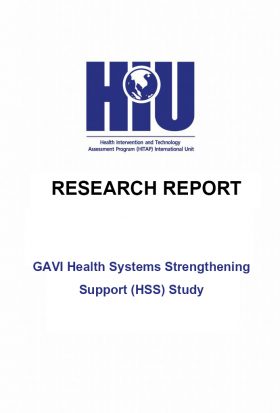This website uses cookies so that we can provide you with the best user experience possible. Cookie information is stored in your browser and performs functions such as recognising you when you return to our website and helping our team to understand which sections of the website you find most interesting and useful.
RESEARCH REPORT: GAVI HEALTH SYSTEM STRENGTHENING SUPPORT (HSS) IN MYANMAR

Details
In 2008, the Government of the Union of Myanmar submitted a proposal for Health Systems Strengthening Support (HSS) to Gavi, a global agency that supports children’s access to vaccines, to bolster efforts for a system-wide approach to address shortcomings in maternal and child healthcare. Approved in the same year, funding was received in 2011 with activities starting in 2012. Over three years, the program was expanded to over a hundred townships in a phased manner, covering a range of activities including developing coordinated township health plans, package of health services to hard-to-reach areas, health financing schemes, provision of supply and equipment, and construction of sub-centers. The programs closed in 2015 and implementation was continued with a no-cost extension in 2016 and 2017.
As part of this program, two health financing schemes, the Hospital Equity Fund (HEF) and the Maternal and Child Health Care Voucher Scheme (MVS or MCHVS), were introduced to mitigate demand-side constraints to accessing healthcare using different modalities. These schemes are among the earliest and largest implemented in Myanmar.
With the closure of the Gavi HSS program, the World Health Organization (WHO), on behalf of the Ministry of Health and Sports (MoHS), requested the Health Intervention and Technology Assessment Program (HITAP), Ministry of Public Health, Thailand, to provide technical support to conduct a study which could understand the impact of the program especially health financing schemes of the HEF and MCHVS schemes and the impact of the program on OOPE.




